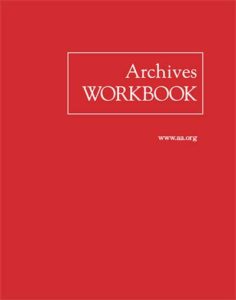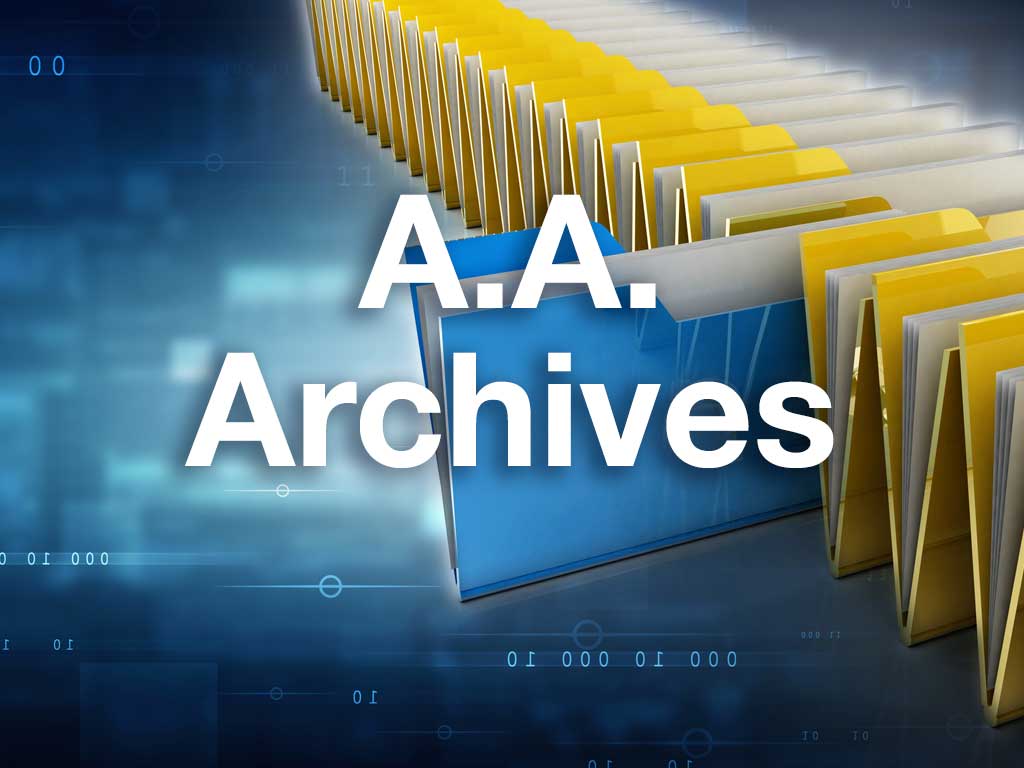The A.A. Archives Category
This category is for AA members that work with, are interested in, or curious about AA Archives. We welcome your questions and comments as you enter into the discussions and hope you’ll find useful information here.
We are a group of AA Archivists, Archives committee chairs, and AA history buffs from groups, districts, areas, regions, Intergroups, and central offices. We range in recovery time and service from a few days to multiple decades. Some of us are professional historians and preservationists while others are AA members trying to learn what to do with the stack of group documents and pictures found in the back of a drawer. Everyone is welcome and encouraged to share their questions and experiences.
Below are some links and information many of us have found useful:

About the National A.A. Archives Workshop
The National Alcoholics Anonymous Archives Workshop (“NAAAW”) began in 1996 with a Workshop held in Akron, Ohio at the Mayflower Hotel. The Workshop grew out of the desire of a group of Archivists to have a Workshop for the Archivists operating within the General Service, Intergroup, and Institutions structures. These Archivists are found all across North America as well as the rest of the world. We take our inspiration from the first General Service Archivist, Nell Wing (a non-alcoholic), and all of the subsequent General Service Office Archivists.
Archives Workbook (M-44i)
For A.A.s interested in service in A.A. archives, this workbook offers shared experience on committee activities, setting up a repository, preservation work, copyright, collecting oral histories, and more. It also provides information about accessing materials in the GSO Archives.

A.A. General Service Office Archives
The mission of the Alcoholics Anonymous General Service Office Archives is to document permanently the work of Alcoholics Anonymous, to make the history of the organization accessible to A.A. members and other researchers, and to provide a context for understanding A.A.’s progression, principles, and traditions.
Purpose
Consistent with A.A.’s primary purpose of maintaining our sobriety and helping other alcoholics achieve recovery, the Archives of Alcoholics Anonymous will:
- Receive, classify and index all relevant material, such as administrative files and records, digital materials, correspondence, and literary works and artifacts considered to have historical importance to Alcoholics Anonymous;
- Hold and preserve such material;
- Provide access to these materials, as determined by the archivist in consultation with the trustees’ Archives Committee, to members of Alcoholics Anonymous and to others who may have a valid need to review such material, contingent upon a commitment to preserve the anonymity of our members;
- Serve as a resource and laboratory to stimulate and nourish learning;
- Provide information services to assist the operations of Alcoholics Anonymous;
- Promote knowledge and understanding of the origins, goals and program of Alcoholics Anonymous.
Adopted: October 30, 2006 by the General Service Board of Alcoholics Anonymous (revised January 2021)
The idea for organizing a historical collection of the Fellowship’s records came from co-founder Bill W. in the early 1950s. Bill was becoming increasingly concerned that “the history of Alcoholics Anonymous is still veiled in the deep fog.” Knowing that the office correspondence was loosely maintained in the drawers at the General Headquarters, he set out to arrange our historical records. He personally recorded oldtimers’ recollections in the Akron/Cleveland area; he sent out boxes of blank tapes to others, encouraging them to record their recollections. Bill’s far-reaching vision outlined an archival message that is still sound today.
He said: “Every one of the new and unexpected developments (in A.A.) has, lying just underneath, an enormous amount of dramatic incident and experience—stories galore.… It isn’t hard to prepare a fact sheet of what happened— that is, dates when people came in, groups started, and so forth. The hard thing to lay hold of is the atmosphere of the whole proceedings and anecdotal material that will make the early experience alive.” After many decades of tireless organizing and arranging, the G.S.O. Archives room was opened with a formal ribbon-cutting ceremony in November 1975.
Since then, the G.S.O. archivists and the trustees serving on the Archives Committee of the General Service Board have encouraged the importance of archival service, which is vital to the survival of the Fellowship. As a result of that work, today almost all areas have set up archival collections, and there is a significant growth at the district level. Historical records help us to sift through our day-to-day experience in recovery and reach back for the shared experience from the past.
As we sort out the myth from the facts we ensure that our original message of recovery, unity and service remains the same in a changing, growing, expanding Fellowship that constantly renews itself. Archives are frequently associated with the past, but they are also to be linked with true value. We maintain records of permanent value so we can go back and consult the original sources again and again.
